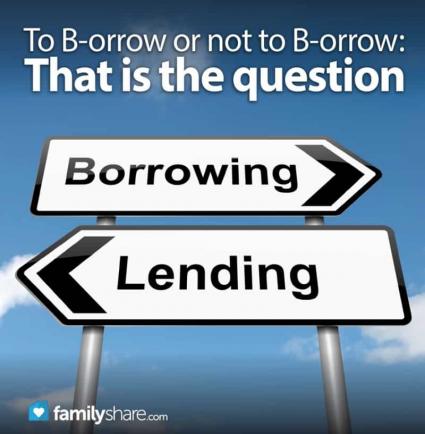
In Hamlet's day, it was impossible for most people to borrow money to buy things. Your purchasing power was limited to the coins in your purse. In fact, it was Shakespeare who said, "Neither a borrower nor a lender be."�
In our modern age, you can borrow for just about everything. You can buy a pizza on a credit card. Of course, when making minimum payments, it might take you two years or more to pay it off.
So when is borrowing smart and when is it dumb? A common rule of thumb is to only borrow for things that go up in value, not down in value. Let's apply this rule and see where borrowing is smart.
Buying a house
Historically, home values have increased over time. Unless you are planning to move shortly, borrowing to buy a house could be a smart move. Just make sure you have an adequate down payment and select a fixed-rate mortgage. People who borrow with too little down sometimes end up with a mortgage higher than their home value, if the market dips, making it hard to move. People who choose variable rate mortgages risk a payment higher than they can afford if interest rates rise.
Paying for education
If you go to school and learn a skill that can double your income, is that a good deal? Absolutely. But what if a big chunk of that higher income goes to paying back a student loan? Not so smart. What if you take out loans and then fail to finish your schooling? Even worse. You also need to consider the income potential for the education you are acquiring. It may cost the same to get an art degree or a chemistry degree, but a chemistry degree could lead to higher-paying jobs.
Buying a car
Cars typically go down in value. Generally speaking, taking out a car loan may not always be smart. However, sometimes a car can get you to a job that pays more; one that would not be possible using public transportation. Some people define success by the snazzy car parked in their driveway. But if that nice new car comes with a big loan you are losing money two ways - your loan payment could have been used for something else, and your car drops in value by hundreds of dollars every month. One of my neighbors has a nice job. He could afford to drive a nice car. Instead, he bought a car that was more than 10 years old for $1,000. He drove it for four years with no major repairs and sold it for $950. That's about $1 a month! What have you been spending on your car each month?
Buying a Time-Share Unit
Not a smart borrowing choice. Just look at the resale market for time-shares. It is hard to see anyone getting back what they paid for, plus the interest rates are usually quite high.
90 Day Same as Cash
CBS News has reported that nine out of ten times people don't pay off their 90 day loans in 90 days. The interest due is backdated to the start of the loan, and the interest rate is normally quite high. If you pay cash, you'll get a better deal.
Payday loans
Some people just need a few hundred dollars to get by until the next paycheck. Payday loans are really easy to get. Unfortunately, the average payday loan customer, although they may be borrowing only $200-$300 at a time, can easily rack up $500 or more in fees each year. That's enough to create an emergency fund you can use for short-term borrowing needs.
Credit cards
Credit cards can be a great convenience, but they can also bury you in debt. People who don't pay off their balances every month often end up with credit card balances of $10,000, $20,000, or even more. Even people who pay off their credit cards each month may be hurting their finances. This is because people spend more when they use plastic instead of cash. This is most common when you spend money on clothing, food, and entertainment. Overspending just a $100 a month could cost you more than $1,000 a year. Could you use an extra $1,000? Remember, if you use credit cards, pay them off each month and don't use them for impulse purchases.
Shakespeare's "Hamlet" is a tragedy. By the end of the play, just about all the characters are dead. "I must be cruel, only to be kind: Thus bad begins and worse remains behind." Don't end up dead broke by choosing to borrow when you shouldn't.
This article was originally published on FamilyShare.com. Check out these other related articles: (In my 20s: Why should I save for retirement?), (10 things first-time home buyers should know), (3 mistakes to avoid when saving for your family's financial future).

